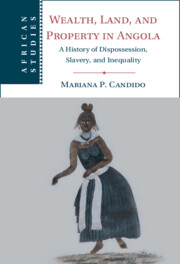Book contents
- Wealth, Land, and Property in Angola
- African Studies Series
- Wealth, Land, and Property in Angola
- Copyright page
- Contents
- Maps and Plans
- Illustrations
- Tables and Graphs
- Acknowledgments
- A Note on Currency and Price-Level Adjustments
- Introduction
- 1 Who Owned What?
- 2 Property Rights in the Nineteenth Century
- 3 Written Records and Gendered Strategies to Secure Property
- 4 Commodification of Human Beings
- 5 Branded in Freedom
- 6 The Erasure of Communal Rights
- 7 Global Consumers: West Central Africans and the Accumulation of Things
- Conclusion
- Bibliography
- Index
- African Studies Series
Conclusion
Published online by Cambridge University Press: 22 September 2022
- Wealth, Land, and Property in Angola
- African Studies Series
- Wealth, Land, and Property in Angola
- Copyright page
- Contents
- Maps and Plans
- Illustrations
- Tables and Graphs
- Acknowledgments
- A Note on Currency and Price-Level Adjustments
- Introduction
- 1 Who Owned What?
- 2 Property Rights in the Nineteenth Century
- 3 Written Records and Gendered Strategies to Secure Property
- 4 Commodification of Human Beings
- 5 Branded in Freedom
- 6 The Erasure of Communal Rights
- 7 Global Consumers: West Central Africans and the Accumulation of Things
- Conclusion
- Bibliography
- Index
- African Studies Series
Summary
The history of wealth accumulation and dispossession in Angola has been intertwined with the consolidation of liberal notions of progress, private property rights, land enclosure, and civilization. This is not a history of progress, but an account of dismantling – dismantle of communal rights and values that ordered societies. West Central African societies did not move progressively from one type of wealth, in people, to private property. In fact, West Central African communities valued both: territory and kinship. Wealth in people cannot exist in isolation from land control. An alternative interpretation of the past is necessary, moving away from earlier arguments that placed West Central Africans as primitive or backward and reifying colonialism and land grabbing. This is an effort to problematize recent interpretations of the Angolan past that understood territorial occupation, population removals, and dispossession as inevitable. As it is clear in local archives, West Central Africans valued land since 1600 – perhaps even earlier.
- Type
- Chapter
- Information
- Wealth, Land, and Property in AngolaA History of Dispossession, Slavery, and Inequality, pp. 274 - 277Publisher: Cambridge University PressPrint publication year: 2022

